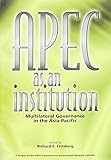APEC as an Institution : Multilateral Governance in the Asia-Pacific / ed. by Richard Feinberg.
Material type: TextPublisher: Singapore : ISEAS Publishing, [2003]Copyright date: ©2003Description: 1 online resource (280 p.)Content type:
TextPublisher: Singapore : ISEAS Publishing, [2003]Copyright date: ©2003Description: 1 online resource (280 p.)Content type: - 9789812302090
- 9789812305015
- 380
- online - DeGruyter
| Item type | Current library | Call number | URL | Status | Notes | Barcode | |
|---|---|---|---|---|---|---|---|
 eBook
eBook
|
Biblioteca "Angelicum" Pont. Univ. S.Tommaso d'Aquino Nuvola online | online - DeGruyter (Browse shelf(Opens below)) | Online access | Not for loan (Accesso limitato) | Accesso per gli utenti autorizzati / Access for authorized users | (dgr)9789812305015 |
Frontmatter -- CONTENTS -- THE CONTRIBUTORS -- GLOSSARY -- INTRODUCTION -- SECTION I. POLICY REPORT -- 1. Remaking APEC as an Institution -- SECTION II. APEC’S STRATEGIC OBJECTIVES -- 2. APEC’s Overall Goals and Objectives, Evolution and Current Status -- 3. APEC as a Pacific OECD Revisited -- SECTION III. MANAGEMENT REFORMS -- 4. The APEC Secretariat -- 5. Project Selection and Evaluation -- SECTION IV. TRADE, INVESTMENT AND ECOTECH -- 6. The APEC Decision-Making Process for Trade Policy Issues -- 7. Towards an Assessment of APEC Trade Liberalization and Facilitation -- 8. Investment Liberalization and Facilitation in the Asia Pacific -- 9. The Wheel that Drives APEC -- 10. Potential in Search of Achievement -- SECTION V. NON-GOVERNMENTAL PARTICIPATION IN APEC -- 11. Business Involvement in APEC -- 12. Civil Society Participation in APEC -- SECTION VI. APEC AND THE SECURITY AGENDA: FIRST THOUGHTS -- 13. APEC’S Role in Political and Security Issues -- INDEX
restricted access online access with authorization star
http://purl.org/coar/access_right/c_16ec
APEC is an experimental multilateralism, relying not on a large bureaucracy but rather upon national government agencies, semi-autonomous inter-governmental committees and "virtual" associations. Organized around the principles of consensus, voluntarism and unilateralism, APEC has eschewed binding agreements enforced through monitoring and robust compliance mechanisms. This volume assesses the strengths and weaknesses of APEC's "soft" institutionalism, and its capstone policy report, "Remaking APEC", identifies reforms that would close the credibility gap between APEC's promises and accomplishments. Chapters by leading scholars at APEC Study Centres investigate APEC's core agenda -- trade and investment liberalization and capacity-building -- delve into the inner workings of APEC's bureaucracy, and explore APEC's interactions with civil society, including the private sector and NGOs. This volume contains both the policy report and in-depth specialized studies. It is the product of the APEC International Assessment Network (APIAN), a collaborative, independent project among participating APEC Study Centres. APIAN's first major study, Assessing APEC's Progress: Trade, Ecotech and Institutions was also published by ISEAS(2001).
Mode of access: Internet via World Wide Web.
In English.
Description based on online resource; title from PDF title page (publisher's Web site, viewed 01. Dez 2022)


